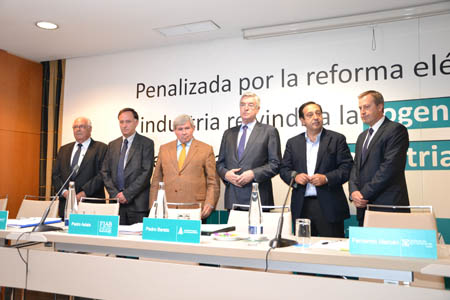Several associations claim the cogeneration like key tool for reindustrializar Spain
21 March 2014
The industries of tiles and baldosas ceramic, papelera, feeding and drunk, and bricks and knit, the agricultural association youngsters-agriculturalists and cooperative agro-alimentary, representing thousands companies and million workers, report that the electrical reform penalises the energetic efficiency of his industries and activities.

Isidro Zarzoso, of Ascer, Eduardo Querol, of Aspapel, José Malpesa, of Hispalyt, Pedro Astals of Fiab, Pedro Cheap, of Asaja, and Fernando Marcén, of Cooperatives Agro-Alimentary of Spain, presidents of the associations signatories, described the importance of the cogeneration in his respective activities and the negative consequences that would involve for his sectors the approval of this rule that inscribes in the last measures of the electrical reform and that would suppose the practical disappearance in a year of the plants of cogeneration.
The document has sent to the Minister of industry with the application of interview and the ofrecimiento of support and collaboration of the associations to reach a solution that avoid the very grave potential consequences. The signatories trust that the Ministry attend his offer of dialogue.
The cogeneration is a technology of high efficiency with which determinate industries or activities manufacture his products saving more than 10% of primary power. Supported and promoted by the European Union by his energetic advantages, environingingmental and economic, consists in taking advantage of to the maximum the power, generating at the same time and in a same process electricity and necessary heat in different industrial activities, saving power and broadcasts. It is power distributed that saves in networks of transport and avoids losses: it consumes where produces . It supposes a key tool for intensive industries in energetic consumption –that need a lot of power to manufacture his products-, because it does them more efficient energetically and, therefore, more competitive, paliando partly the high prices that pay in Spain by the electricity, winning exporting capacity and generating activity and employment. Like this, 20% of the industrial GDP can use power from cogeneration.
The electrical reform abuses to the cogeneration, penalising precisely to the industries and activities that contribute to the energetic efficiency of the country. In 2013, the new taxles to the gas, to the generation, to the CO2 and other cuts have struck to the cogeneration to such an extent that 20% of the plants had to stop by fault of profitability. Now, the last rule of the reform -the proposal of Ministerial order-, will do that the plants go in in operative losses and have to close. If this sucede, the industries associated will see to shoot his energetic costs putting in risk his capacity to produce, compete, export, keep the activity and the employment.
The proposal of Ministerial order of the reform does unfeasible the cogeneration since directly it situates in operative losses to the majority of the plants; the costs and taxles are upper to the reward that fixes the Government. The rule breaks the new Law 24/2013 of the Electrical Sector that guarantees “to cover the costs that allow to compete to the installations of cogeneration of high efficiency in level of equality with the rest of technologies in the market and that allow to obtain a reasonable profitability”.


















